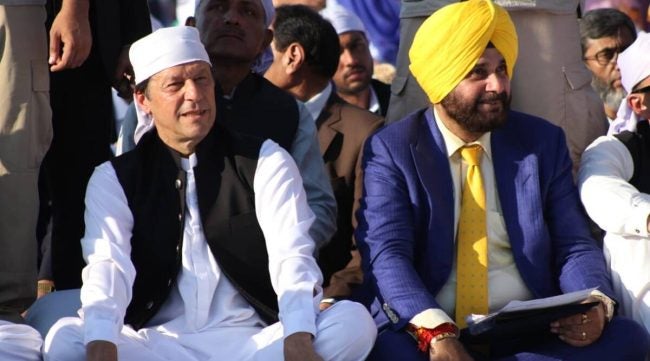Reopening the Kartarpur Corridor: Tangible Benefits for Indo-Pak Ties
Zahid Shahab Ahmed
29 November 2021Summary
Considering that the India-Pakistan relationship has faced multiple challenges in recent years, the two sides recently agreeing to re-open the Kartarpur corridor is a positive development.
It is another tragedy of the 1947 Partition that the division of Punjab between India and Pakistan led to the Sikh community having their sacred places on both sides of the border. Until recently, for the Sikh population in India, it was a difficult task to visit their holy sites in Pakistan such as Gurdwara Panja Sahib, Shrine of Guru Aryan Dev and Gurdwara Darbar Sahib. While the conflictual India-Pakistan relations have created difficulties for Indian Sikhs to visit Pakistan, the Sikh diaspora in the West have had less issues undertaking religious pilgrimages to Pakistan.
The relationship between India and Pakistan has been on a downward trajectory for several years now. Despite longstanding disagreements over Kashmir, Islamabad and New Delhi now have growing differences on Taliban-led Afghanistan. When the Taliban began gaining control of territories in July-August 2021, India closed all its diplomatic missions in Afghanistan. In November 2021, New Delhi hosted the third Regional Security Dialogue on Afghanistan involving some of its neighbours such as Russia and Iran, but there was no representation from China, Pakistan and Afghanistan. Against this backdrop, it was surprising and a positive development that New Delhi and Islamabad have re-opened the Kartarpur corridor which was closed in March 2020 due to the COVID-19 pandemic.
This corridor is merely 4.7 kilometres inside the India-Pakistan border and offers visa-free entry for visitors from India, mainly Sikhs, to Gurdwara Darbar Sahib in Pakistan. The original idea for the corridor emerged during a meeting between the prime ministers of India and Pakistan in early 1999, but the proposal remained in cold storage until Imran Khan’s government came to power in 2018. Khan has been a strong supporter of reviving tourism in Pakistan and improving the country’s image globally. As a sign of respect for the rights of religious minorities – in this case, the Sikhs – both sides agreed to start the project in November 2018 and the corridor eventually opened on 12 November 2019 on the 550th birth anniversary of Guru Nanak (the founder of Sikhism). For Sikhs, Gurdwara Darbar Sahib is of great importance because Guru Nanak spent 18 years of his life and died there in 1539.
As soon as the Kartarpur corridor was opened, thousands of Sikh pilgrims visited it from around the world, a large majority from India’s Punjab. Until this point, all pilgrims, including the ones living just a few kilometres away from Gurdwara Darbar Sahib, had to go through the lengthy process of obtaining a Pakistan visa and then travelling by air or by road through the Wagah border. It was a time-consuming and costly process for many poor pilgrims who now can visit their sacred site on a visa fee of US$20 (S$27.37). Until the opening of the corridor, thousands of Sikhs flocked to Dera Baba Nanak at the India-Pakistan border to get a glimpse (darshan) of Gurdwara Darbar Sahib through the large binoculars positioned on a viewing platform there. Those binoculars have now been taken down.
While India is also likely to benefit economically from the opening of the corridor, Pakistan has more to gain. Besides increasing its goodwill, Pakistan can gain substantially on its investment. For the construction, Pakistan earmarked roughly US$10 million (S$13.69 million) and an estimate suggests that it can gain as much as US$80 million (S$109.49 million) per annum from the corridor. However, like many other pilgrim centres around the world, the COVID-19 restrictions put paid to these plans.
In October 2020, Pakistan re-opened the corridor on its side after evaluating a significant decrease in COVID-19 cases in India and Pakistan, as well as the speed of vaccination. India’s reluctance to reciprocate boiled down to political reasons. However, a year later, cognisant of the sentiments of the minority Sikh community, New Delhi agreed to re-open the Kartarpur corridor in November 2021. An estimated 8,000 Sikh pilgrims from around the world were expected to visit the pilgrim site for Guru Nanak’s birthday this year.
Among the key proponents of the Kartarpur corridor are two former cricketers from either side, namely, Khan and Navjot Singh Sidhu from India. Sidhu is Khan’s close friend and was invited to his oath-taking ceremony as Pakistan’s prime minister in 2018. Now a politician with the Congress party, Sidhu did not missed the opportunity to revisit the holy shrine. He is loved in Pakistan for his poetry and receives much media attention. Such gestures are perhaps the first steps to normalising ties between India and Pakistan. Most of all, Sidhu credited the leadership of both countries for facilitating the Sikh pilgrims.
From within India, there are elements that continue to securitise the Kartarpur corridor. However, it has not shown any signs of negative security implications for India and Pakistan. Moving forward, both sides need to ensure that such an important initiative is protected from any undue politicisation. While the corridor is primarily significant for the Sikhs, it has the potential of bringing intangible benefits to India-Pakistan relations.
. . . . .
Dr Zahid Shahab Ahmed is a Non-Resident Fellow at the Institute of South Asian Studies (ISAS), an autonomous research institute at the National University of Singapore (NUS). He is also Research Fellow at the Alfred Deakin Institute, Deakin University, Australia. He can be contacted at zahid.ahmed@deakin.edu.au. The author bears full responsibility for the facts cited and opinions expressed in this paper.
Photo credit: Twitter/PTI Official
-
 More From :
More From :
-
 Tags :
Tags :
-
 Download PDF
Download PDF



